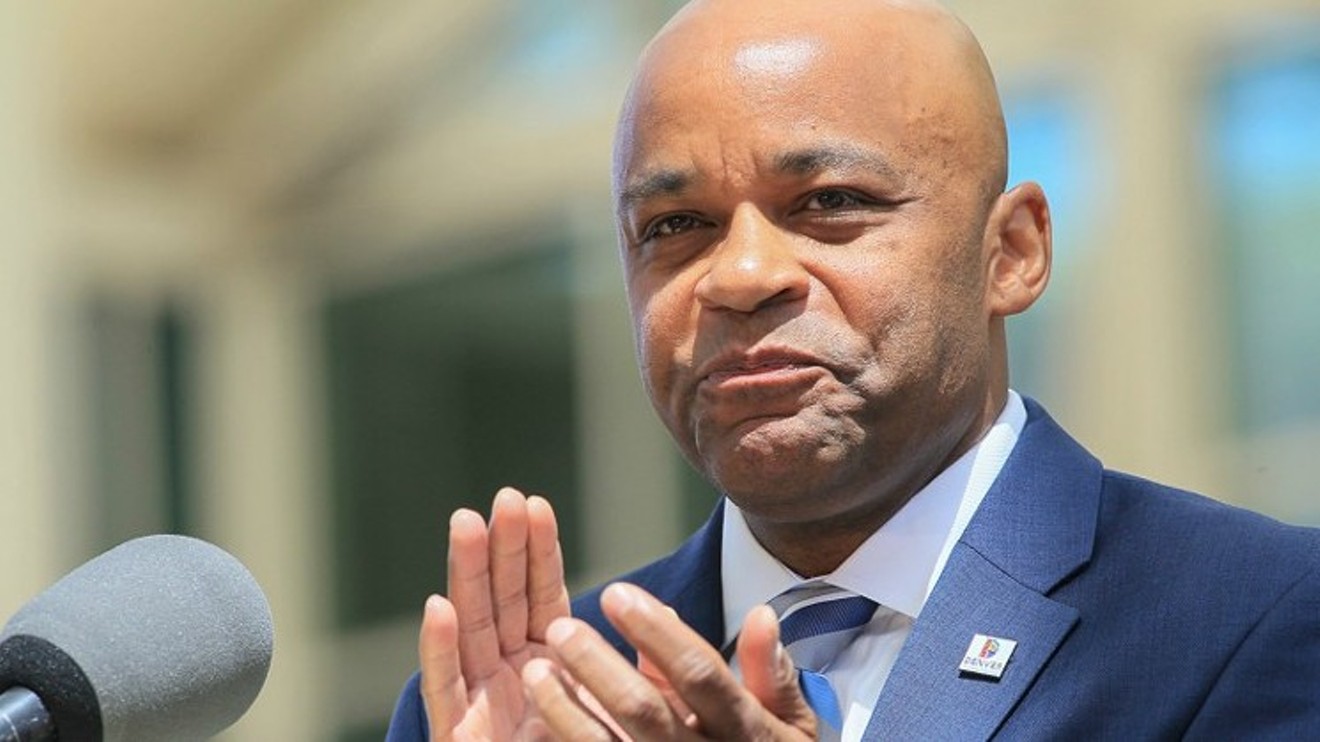Denver Mayor Michael Hancock has announced a new citywide effort to expunge low-level marijuana convictions that occurred in Denver before recreational marijuana was legalized in Colorado.
According to the mayor's office, more than 10,000 convictions for low-level marijuana crimes from 2001 to 2013 are now eligible for expungement.
“For too long, the lives of low-income residents and those living in our communities of color have been negatively affected by low-level marijuana convictions,” Hancock says in a statement. “This is an injustice that needs to be corrected, and we are going to provide a pathway to move on from an era of marijuana prohibition that has impacted the lives of thousands of people.”
The move comes after months of collaboration with the Denver Office of Marijuana Policy and City Attorney’s Office; the Denver District Attorney, Denver County Courts and marijuana stakeholders were consulted to develop the process for expunging records.
Hancock's staff says he first signaled his desire for the move during the creation of a national mayoral group calling for federal marijuana policy updates.
According to the announcement, the mayor's office is also looking at ways to use marijuana tax revenue to further support low- and moderate-income neighborhoods, as well as avenues to increase minority participation in the legal pot industry.
“We need to better understand the obstacles, business conditions and regulatory hurdles preventing individuals from seeking employment or business ownership in the cannabis industry,” Hancock explains. “We believe in equal opportunity for all, and that includes those working in the cannabis industry.”
In August, Hancock increased Denver's special marijuana sales tax from 3.5 to 5.5 percent in an effort to raise around $8 million per year for affordable-housing efforts.
Marijuana activist and communications consultant Mason Tvert, who spearheaded decriminalization efforts across Colorado in the early 2000s, called it "better late than never." Tvert is still unhappy about Hancock's opposition toward legalization efforts in 2005 and 2007, when Hancock was still a member of the Denver City Council.
"This is certainly welcome news. It's too bad he didn't have this feeling starting in 2005, when the voters of Denver called for an end to marijuana possession arrests, and in 2007, when they called for marijuana possession to be the lowest law enforcement priority. He opposed both of those, and Amendment 64," Tvert says. "It's not something adults should be punished for. This isn't something that should brand someone a criminal for the rest their lives."
Still, Tvert concluded that it's "great to see he's come around" on the issue.
The news of Denver's expungement comes on the heels of Boulder County District Attorney Michael Dougherty's new campaign, "Moving On From Marijuana," which involves vacating pot convictions for actions that would have been lawful after the 2012 passage of Amendment 64.
Recent and successful legalization efforts in Vermont have allowed past marijuana offenders to have similar convictions removed from their records, while the governor of California signed a bill in September that could expunge convictions or reduce sentences from marijuana-related convictions going back decades.
The Colorado General Assembly passed a law on 2017 that allows misdemeanor marijuana use or possession to be sealed, but not erased, from someone's record if it is not currently a crime, and Oregon's state legislature passed a similar bill in 2015, the same year recreational pot sales began in the state. Massachusetts lawmakers are considering a bill that would expunge low-level marijuana convictions, but are still awaiting the results of an investigation into the state's current marijuana laws.
Update: This story was updated at 10:20 a.m. on December 4 to include comments from Mason Tvert.
[
{
"name": "Air - MediumRectangle - Inline Content - Mobile Display Size",
"component": "12017618",
"insertPoint": "2",
"requiredCountToDisplay": "2"
},{
"name": "Editor Picks",
"component": "17242653",
"insertPoint": "4",
"requiredCountToDisplay": "1"
},{
"name": "Inline Links",
"component": "18838239",
"insertPoint": "8th",
"startingPoint": 8,
"requiredCountToDisplay": "7",
"maxInsertions": 25
},{
"name": "Air - MediumRectangle - Combo - Inline Content",
"component": "17261320",
"insertPoint": "8th",
"startingPoint": 8,
"requiredCountToDisplay": "7",
"maxInsertions": 25
},{
"name": "Inline Links",
"component": "18838239",
"insertPoint": "8th",
"startingPoint": 12,
"requiredCountToDisplay": "11",
"maxInsertions": 25
},{
"name": "Air - Leaderboard Tower - Combo - Inline Content",
"component": "17261321",
"insertPoint": "8th",
"startingPoint": 12,
"requiredCountToDisplay": "11",
"maxInsertions": 25
}
]












